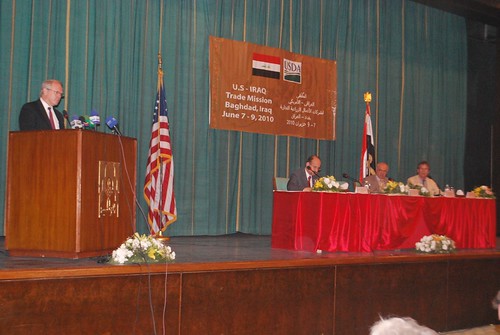By Dan Berman, Senior Advisor to the Administrator, USDA’s Foreign Agricultural Service
What comes to your mind when you think of Iraq? Like many, my perceptions were created by years of media reporting. On Saturday, I arrived in Baghdad in a Blackhawk helicopter, and am still processing my feelings of heartbreak and inspiration. Yesterday I was honored to open the first U.S. agribusiness trade mission to Iraq in more than 20 years. At the opening plenary session, nearly 20 U.S. companies and more than 150 Iraqi entrepreneurs and buyers were present, as well as U.S. and Iraqi government officials. The U.S. companies on the mission are both large and small, representing commodity, consumer-ready food, and forest product industries, as well as agricultural input suppliers, including agricultural equipment and irrigation system manufacturers.
The purpose of this trade mission is simple: to increase U.S. agricultural exports to Iraq, promote joint ventures, and boost investment in Iraq’s developing agricultural sector. Over two days, U.S. and Iraqi producers, processors, buyers, traders, and investors will meet face-to-face in dozens of one-on-one meetings. In these meetings business will be conducted, ideas will be exchanged, and friendships will be forged. The courage and optimism of all the participants cannot be overstated. We hope this mission will be looked back on as a turning point in our relationship. As Ambassador Christopher Hill said in the opening address, we hope we will move from America being represented by General Petraeus and General Odierno, to General Foods and General Mills.
Agriculture is an important part of Iraq’s economy. It is the country’s second largest economic sector, accounting for 9.6 percent of its gross domestic product and employing about 20 percent of its labor force. The country’s farmers produce wheat, barley, rice, vegetables, dates, cotton, livestock, and poultry. But, with Iraq’s population expected to nearly double in the next 25 years, agricultural imports, including those produced by Iraqi farmers plus edible oils, pulses, and a variety of consumer-ready products, are needed to feed the country’s growing urban middle class and low-income consumers. In addition, Iraq has vast natural resources and great potential to further boost agricultural productivity and output of a broad array of farm products. What it needs are agricultural inputs, such as seeds, feed, and machinery to put this potential to work. With greater access to inputs, Iraq’s agricultural sector can develop more quickly. The U.S. companies on this mission can meet these varied needs.
USDA’s strategy also reflects the Strategic Framework Agreement that the United States and Iraq signed in December 2008. That agreement outlines the U.S.-Iraq bilateral relationship and recognizes that building a prosperous and diversified economy in Iraq will be key to its stability and integration into the world economy.
I am someone who has worked for over 30 years to promote America’s agricultural exports all over the world. Nothing prepared me for what I have seen here and the spirit and resilience and spirit of the USDA and entire U.S. Government and military team working here in Iraq to give the people here a better chance to live the way anyone would want to, in security and freedom.

USDA Head of Delegation Dan Berman discussed the benefits of expanded agriculture trade with Iraqi TV at the June 8 kickoff for the U.S.-Iraq Agriculture Trade Mission in Baghdad.

Ambassador Christopher R. Hill opened the U.S.-Iraq Agriculture Trade Mission for an audience of more than 175 U.S. and Iraqi farmers, business people and officials. Minister of Trade Dr. Safaeddin Mohamed Safi, Senior Deputy Minister of Agriculture Dr. Subhi Al-Jumailly and USDA Head of Delegation Dan Berman also offered remarks at the opening ceremony.

